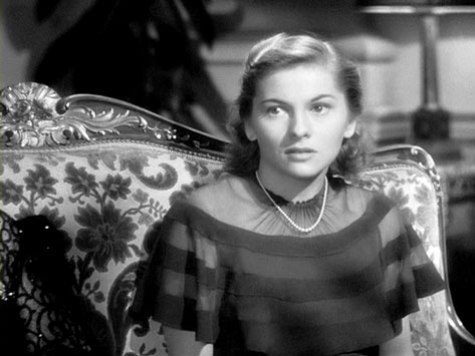In 1941, Joan Fontaine won the Best Actress Oscar for her portrayal of a wife deeply in love with a charming husband (Cary Grant), who might want her dead. She was wonderfully delicate and vulnerable in Alfred Hitchcock’s “Suspicion,” and no one questions her winning the Oscar. But many believe it was a belated make-up award from the Academy for her jaw-dropping work the year before in Hitchcock’s “Rebecca.”
“Rebecca” made Fontaine a star. Due to more bad choices than those made by Nicolas Cage, it was a fame that wouldn’t last long, but as “the second Mrs. De Winter,” Fontaine cemented her place in film history. She not only starred in 1940’s Best Picture, she gave one of the ten-best performances ever put on film by any actress.
Biographies of producer David O. Selznick and Hitchcock that I’ve read confirm that the production was extremely difficult for Fontaine. It was her first starring role, a highly anticipated picture based on Daphne du Maurier’s mega-seller, and everyone knew its success would rise or fall on the performance of this 23 year-old ingénue, who until then had played only a few small roles. Moreover, her co-star, Laurence Olivier, resented the then-unknown Fontaine for winning the role. He had lobbied for his wife Vivien Leigh (who would have been horribly miscast).
After a chance meeting with Selznick at a dinner party, Fontaine went through six stressful months of auditions before winning the role — and that was the easy part. On the set, Hitchcock (driven in part by Selzinck’s daily memos) never stopped pushing the actress.
The result was nothing short of miraculous. This is what I wrote last year when I reviewed the Bluray release of “Rebecca”:
[T]he real star here is Fontaine, who would go on the following year to work again with Hitchcock in “Suspicion” and win the Oscar for Best Actress. Selznick, hoping to recreate the public relations boost his search for Scarlett O’Hara created, auditioned anyone and everyone, but most certainly made the perfect choice. Fontaine’s beauty takes your breath away, but there is no more difficult persona to pull off than that of an innocent, and this the actress does flawlessly.
One of the pitfalls for Fontaine in playing this nameless heroine was not only the risk of melodramatic, wide-eyed pathos, but in not taxing the patience of the audience with a one-note performance that drains our sympathy through the act of being a perpetual victim. Through the hard work of plotting and characterization, a fine script certainly does some of the heavy-lifting, but it’s the bottomless depth of Fontaine’s eyes that does the real storytelling and communicates that it’s worth hanging in there because there’s much to be discovered in this woman.
In a performance that could have easily collapsed with a single false move, Fontaine never made one. The “second Mrs. De Winter” is never simpering, plying for sympathy, mawkish, or cloying. You have to experience the performance to appreciate just how impressive that is. But Fontaine brilliantly manages to keep a character who is always reacting and caught off guard from becoming tiresome and frustrating. All you feel is sympathy for her and rage at those who victimize her.
The “second Mrs. De Winter” is not a showy role with a physical or mental handicap, a dingo-stole-my-baby accent, old age make-up, or scenery-chewing. It is a role that requires naked and vulnerable acting. Fontaine steals the picture from the likes of an Olivier, Judith Anderson’s Mrs. Danvers, and even George Sanders.
Fontaine’s career would die off as quickly as it arrived. She kept working into the eighties, but other than 1943’s “Jane Eyre,” her time in the sun was over. And other than “Rebecca” and “Suspicion,” Fontaine was best-known for her decades-long feud with her older sister, two-time Oscar winner Olivia de Havilland, who just turned 97 in July.
Fontaine died Sunday at the age of 96 and after having created something few others ever will: a timeless work of art with her performance in “Rebecca.”
Follow John Nolte on Twitter @NolteNC

COMMENTS
Please let us know if you're having issues with commenting.